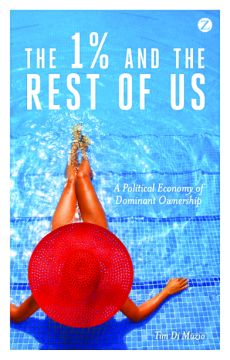
Additional Information
Book Details
Abstract
While the Occupy movement faces many strategic and organizational challenges, one of its major accomplishments has been to draw global attention to the massive disparity of income, wealth and privilege held by 1% of the population in nations across the world. In The 1% and the Rest of Us, Tim Di Muzio explores what it means to be part of a socio-economic order presided over by the super-rich and their political servants.
Incorporating provocative and original arguments about philanthropy, social wealth and the political role of the super-rich, Di Muzio reveals how the 1% are creating a world unto themselves in which the accumulation of ever more money is really a symbolic drive to control society and the natural environment.
'Distills the concepts of capitalism, political economy, finance, inequality, the profligacy of the 1%-ers, and much more in morally coherent chunks of need-to-know information. It is a superb book.'
Dissident Voice
'Tim Di Muzio debunks the radically antisocial belief that wealth is the sole result of individual efforts and talents. His contribution is novel and original, but it is also a significant part of a growing clamour for change.'
Danny Dorling, author of Inequality and the 1% and Population 10 Billion
'Capital is power, wealth is social, the rich are undeserving, growth is unsustainable. In this timely book Di Muzio takes aim not only at the emergence of a global super rich, but also at the ideologies of wealth generation that keep them in their place and us in ours - an indignant call to put people and planet above profit and status.'
Amin Samman, City University London
'This compelling and original work is a must read: it brilliantly illuminates a world dominated by a tiny, immensely powerful ruling class who have accumulated enormous wealth, even during the global economic crisis. It explains why and how that has happened , who they are, and not least how such plutocratic power can be resisted and transformed to better serve the majority of people on the planet.'
Stephen Gill, York University, Toronto
'A highly accessible must-read primer for anyone interested in the world's dominant capital, its incessant drive to accumulate power, and the impact this has on our lives and future.'
Jonathan Nitzan, co-author of Capital as Power
'Tim Di Muzio has produced a remarkable book: remarkable for its original reading of available evidence on the rise of the 1%; remarkable for the creative interweaving of empirical findings and theoretical insights; and remarkable for its politicization of the inequality issue. Di Muzio gives the Capital as Power approach a concrete and down-to-earth bite.'
Henk Overbeek, VU University Amsterdam
Tim Di Muzio is senior lecturer in international relations and political economy at the University of Wollongong in Australia. He currently edits the journal Review of Capital as Power.
Table of Contents
| Section Title | Page | Action | Price |
|---|---|---|---|
| Front Cover | Front cover | ||
| About the Author | i | ||
| Title Page | iii | ||
| Copyright | iv | ||
| Contents | v | ||
| Tables and Figures | vi | ||
| Dedication | viii | ||
| Introduction: Towards a Global Political Economy of the 1% | 1 | ||
| Political Economy and the Elite | 4 | ||
| The Main Arguments and Structure of the Book | 12 | ||
| 1: The Unusual Suspects: Identifying the Global 1% | 21 | ||
| The Professor and the Prince | 21 | ||
| Income and Wealth: A Primer | 22 | ||
| A Taxonomy of the Global 1% | 26 | ||
| Holding Wealth | 35 | ||
| The Geography of the 1% | 40 | ||
| Billionaireville | 43 | ||
| The Rest of Us | 45 | ||
| 2: Capital as Power and the 1% | 48 | ||
| A Brief Genealogy of the Term ‘Capital’ | 51 | ||
| Corporate America and the Rise of Capitalisation | 57 | ||
| Capital as Power | 61 | ||
| The Capitalist Mode of Power | 66 | ||
| The Architecture of Capitalisation | 72 | ||
| 3: Wealth, Money and Power | 103 | ||
| A Brief History of Wealth before Political Economy | 104 | ||
| Mercantilism | 113 | ||
| The Birth of Classical Political Economy | 116 | ||
| The General Theory of Money, Energy and Power | 136 | ||
| 4: Differential Consumption: The Rise of Plutonomy | 142 | ||
| The Global Plutonomy | 143 | ||
| Conspicuous Consumption in the First Gilded Age | 146 | ||
| Differential Consumption in the New Gilded Age | 151 | ||
| ‘The Rich are Destroying the Earth’ | 161 | ||
| 5: Society versus the Superman Theory of Wealth | 165 | ||
| From Hobbes to Locke’s Theory of Ownership | 166 | ||
| Rousseau, Bentham and Mainstream Economics | 172 | ||
| Veblen’s Political Economy | 179 | ||
| Unjust Deserts | 185 | ||
| The Distribution of Wealth and Capital as Power | 188 | ||
| 6: The Party of the 99%: Resistance and Future Prospects | 192 | ||
| Occupy in Context | 193 | ||
| Five Reasons Why Present Trends Will Likely Continue | 199 | ||
| Ten Priorities | 205 | ||
| Creativity, Power and the Meaning of Life | 215 | ||
| Notes | 220 | ||
| Bibliography | 229 | ||
| Index | 242 | ||
| Back Cover | Back cover |
